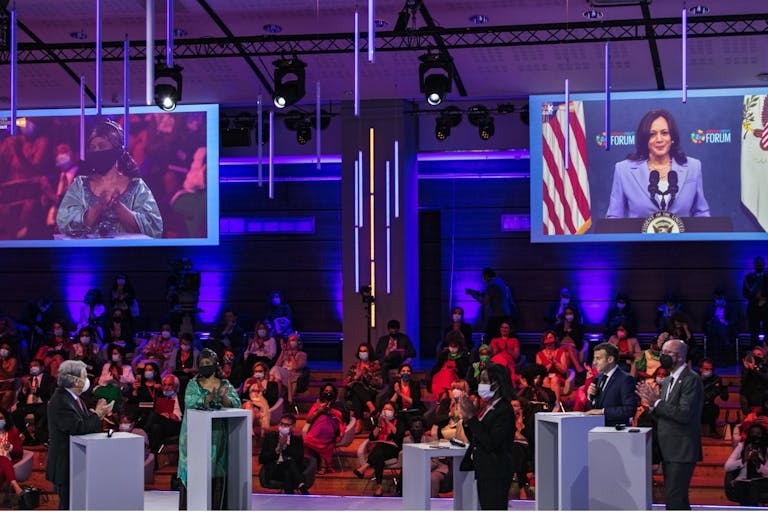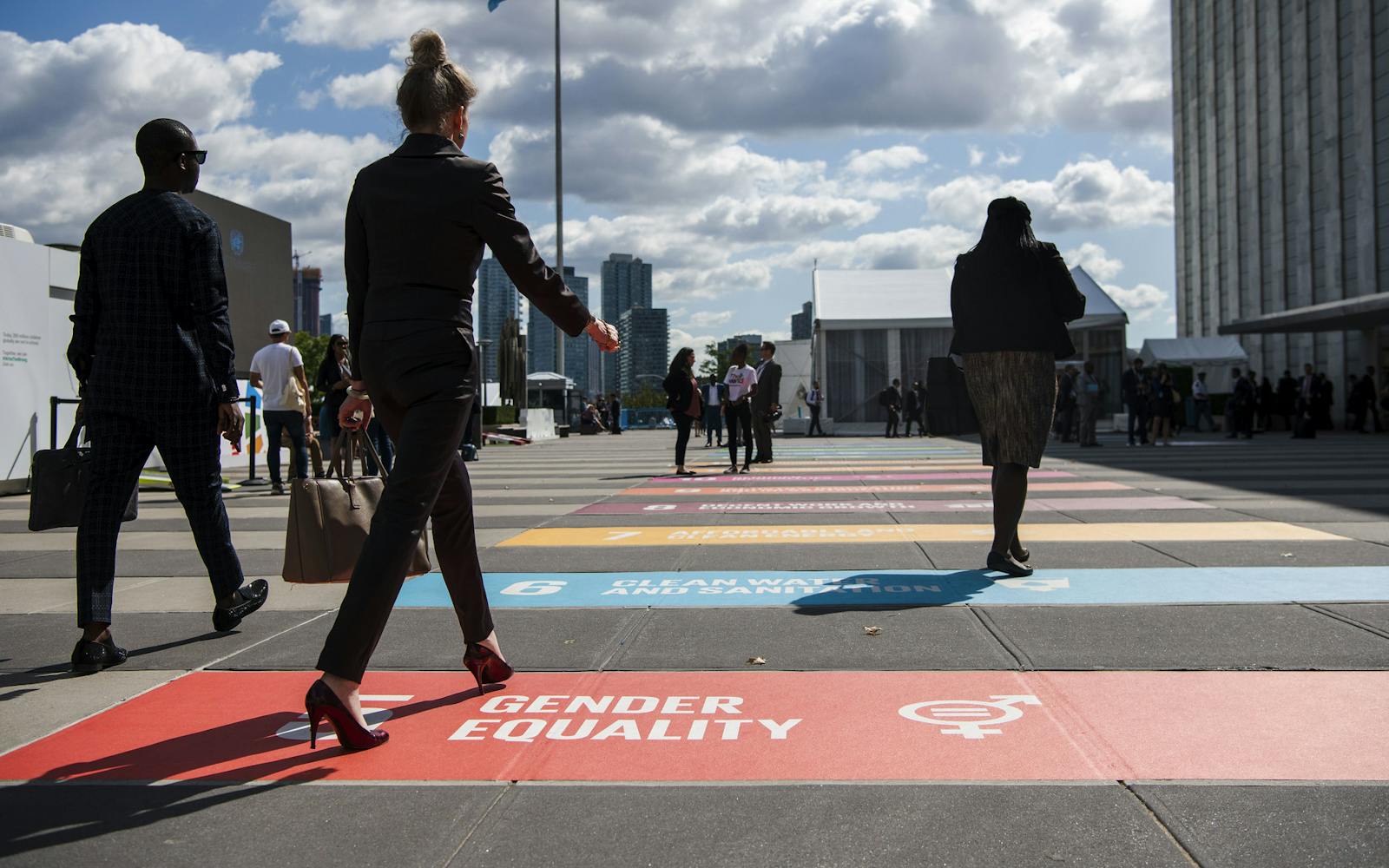Imagine a small group of feminists and gender equality advocates gathered around outdoor tables and under tents, learning how to sit next to and talk to other humans again. I was in New York City, a trip timed to coincide with the 76th UN General Assembly, and very happy and lucky to be among them — a grinning if self-conscious beneficiary of lopsided and unjust vaccine distribution and a U.S. citizen allowed to show up from my home state of Texas.
We were grateful for the camaraderie, the space and time to coordinate advocacy plans, and for the tents in particular given the pouring rain.
It was an unusual UNGA, one starved of the usual parades of global civil society advocates (my favorite part), the protesters and their posters, the abundant motorcades (my least favorite part), and the noisy, crowded events.
The general noise was lower. The stakes were as high as ever. UN Secretary-General António Guterres named gender inequality one of the six great divides that prevent us from achieving progress and peace. During the landmark SDG Moment to promote the Sustainable Development Goals, he declared again what we all know to be true: “We cannot achieve any of the SDGs without gender equality.” The Secretary-General called for investing in girls’ education, dismantling harmful power structures that lead to discrimination and violence against women, and ensuring women’s full and equal participation in all facets of society — giving voice to a list of global imperatives that existed before the pandemic and has become more urgent in its path. In fact, the World Economic Forum reported in March that the pandemic pushed back gender parity by a generation.
What’s a world to do? Push in the other direction.
The Generation Equality Forum (GEF) gave our movement collective lift and life for that task. Convened by UN Women and co-hosted by the governments of France and Mexico, the GEF equipped us with a new multistakeholder model for advancing gender equality and a record-setting $40 billion in commitments from a broad range of partners. Indeed, national governments, private companies, philanthropic organizations, civil society, and UN agencies are lined up to push back against inequality and fight for a fairer and freer future. The GEF also put forth a Global Acceleration Plan to tackle the growing challenges to women’s rights and equality head-on and set an ambitious vision for the future.

So, we have a team and a target. We have a plan. What has changed and comes next? UNGA offered the opportunity to listen closely to colleagues at the UN and UN Women and activists and allies of all kinds. It also offered a chance to hear from world leaders in the General Assembly Hall. The listening and watching revealed two GEF strategies we must keep, and one stubborn habit we should ditch.
Amp Up the Ambition
There has long been a gender equality funding gap, and gender equality has remained stubbornly low on the list of global funding priorities for decades. In the U.S., organizations devoted to the rights and needs of girls and women received only 1.6% of charitable giving in 2017. Other research reveals similar global trends.
Thus, a $40 billion day is not the kind of thing feminists are used to. It’s truly great. It’s also not enough. Indeed, it’s less than half of the net sales of the world’s leading candy companies — in 2020 alone. Now, I’ll challenge you to a foot race for a piece of chocolate, but nonetheless it is important to put $40 billion in context. The world can and must offer more to advance the rights, health, safety, and opportunities of half the world’s population.
And what we do with this momentum and new infusion of cash is equally important. The philanthropic sector committed $4.2 billion at the GEF, which could dramatically improve the operations and capacity of girls’ and women’s organizations with the most urgent funding needs. The private sector pledged $17.5 billion, with commitments to advance equality in their workforces, supply chains, and communities. The Government of Mexico and UN Women launched the Global Alliance for Care, while the United States and Canada made additional investments related to the care economy.
But there’s much more to do, with funding needs left unaddressed and investors on the sidelines. So, while the GEF represented a tide shift in funding for gender equality, the $40 billion investment it earned must be the floor, not the ceiling.
Trust, and Verify
If a movement needs cash, it also needs infrastructure — leadership, a diverse array of actors, bridges to connect them, and a clear approach to keeping everyone on task and on track.
First, the GEF process must be centralized and mainstreamed in UN Women’s work going forward to ensure that this movement has a strong and skilled engine behind it. The UN Women GEF team pioneered an approach to global multistakeholder advocacy, against all odds and during a pandemic. Now, the GEF process must be elevated, integrated, and coordinated with other gender equality accountability moments, and present in all the multilateral moments. The newly appointed Executive Director of UN Women, Sima Sami Bahous of Jordan, will play a particularly critical role in driving the GEF process forward and has lent strong support for GEF thus far.
Second, the GEF tent is big enough to shelter us all. Let’s welcome everyone in. For too long gender equality has been seen as the problem that can wait, the problem that is someone else’s to fix. The achievement of gender equality would be great for everyone, so it shouldn’t be a project for only some of us. It’s not too late to get in the game, and the bigger the team the better.






